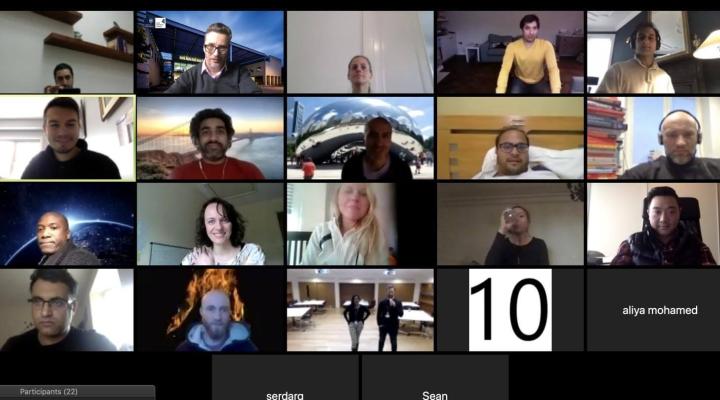Big Tech has long viewed healthcare as a big business opportunity.
Few other industries are large enough to make a dent in the earnings of these trillion-dollar tech giants. The US spends 17% of GDP on healthcare, equivalent to $3.6 trillion (£3 tn) a year. Healthcare is also notoriously inefficient, which makes it a prime target for the kinds of data-driven insights that Big Tech can deliver.
But entering this heavily regulated sector has thus far been very difficult as digital platforms can clash with the logic of public service and the necessity of protecting data privacy.
The coronavirus pandemic has provided a new opening, however, as it amplified the role of digital services in people’s lives while pushing governments to loosen privacy rules so that tech firms can play a greater role in service delivery. The EU has broken down data silos between member states, enabling cross-border digital prescriptions and the sharing of medical records.
Having shaken up retail, entertainment, hospitality, transportation, gaming and music, tech companies are now leveraging their unique strengths to break into the healthcare sector. They are capitalising on their scale to provide valuable insights from vast reams of data, in order to further improve or expand their products and services.
In July 2022 Amazon announced its intentions to buy One Medical, a chain of primary health care clinics in the US; this follows its previous acquisition of the online pharmacy group PillPack. Other examples include, Apple using its Apple Watch to improve cardiovascular health, Microsoft selling its cloud services to hospitals and pharmaceutical companies, and Facebook offering software to help nurses and doctors manage health screenings.
We set out to research the activities of the 5 Big Tech giants in the healthcare sector and determined that Big Tech is entering healthcare through a four-stage process called ‘digital colonisation’.

The first step is supplying data infrastructure services to primary care providers in exchange for data access. These hospitals typically lack capabilities in data management and contract the services out to Big Tech to lower their own costs and improve services.
In the second phase, tech firms will leverage these relationships to gain indirect access to health data already collected in hospitals, overcoming a traditional bottleneck. This is particularly true in countries such as the US with highly privatised healthcare services, creating data silos between disparate facilities. Tech companies act as the connector, building a universal database.
As a third step, this enables them to provide superior data-driven insights that can lower costs and save lives. Google’s London-based artificial intelligence company DeepMind, for example, struck deals with six National Health Service (NHS) trusts in the UK to process medical data. It used this information to develop its Streams app, which alerts medical practitioners when patients are at risk of acute kidney injury, though it has faced legal action, underlining the importance of transparency and patient consent.
This will become a winner-takes-all market, because of network effects, whereby the value of the service is elevated by the amount of data a platform accumulates, such as better recommendations on Netflix. Big Tech will enrich and augment this indirect data with their own sources, their user base and distribution channels to design and commercialise new products and services, putting them into competition with their former clients.
Subsidising hardware and services can help to improve data access. But firms that capture data from multiple channels will have an advantage over those who are dependent on a particular hardware or software, because a vast user base and financial resources can help Big Tech platforms deal with costly regulatory requirements such as GDPR, the UK and EU’s data protection rules.
Creating products and services is the fourth phase of digital colonisation. A good example is Verily, one of Google parent company Alphabet’s businesses that focuses on harnessing health data for insights that predict and prevent diseases. It has, for example, developed wearable non-invasive devices to track blood sugar levels based on its existing cloud and AI capabilities, underling how Big Tech platforms are moving towards the core of value creation in the healthcare sector.
Big Tech's four stage entry into healthcare

But they also capture value by taking profits from sales of these products and services, on top of charging for renting out their data and analytics through commercial partnerships. Although these are two distinct business activities, they complement one another. As firms gain access to data, they develop a unique competitive advantage and become increasingly powerful in healthcare.
Big Tech companies are unlikely to end up offering primary services, because they are generally unprofitable. But they will change the power dynamics in healthcare by commoditising incumbent service providers. It is Big Tech firms that will control the critical data, with healthcare providers merely offering complimentary services, a bit like how Microsoft’s sophisticated software packages rely on ever more powerful chips from Intel. It is the chips that make the software feasible and economical.
It is not hard to imagine digital colonisation being a playbook that Big Tech can apply to other, highly-regulated sectors such as legal, financial and energy services.
By eschewing direct involvement in primary care, Big Tech can become a key player while escaping conventional regulation. And it is not hard to imagine digital colonisation being a playbook that Big Tech can apply to other, highly-regulated sectors such as legal, financial (see my piece on How banking is facilitating big tech's creep into finance) and energy services. (It is already applying it to education as well as healthcare as described in the full research report below.) In this way, they may well evolve into a one-stop shop for digital amenities, much like their counterparts Alibaba and Tencent in China, which offer everything from payments to shopping and gaming on mobile devices.
As Big Tech becomes even bigger, regulators have grown increasingly concerned about their power. The EU has threatened to break up digital companies that engage in anti-competitive behaviour. The dilemma for policymakers is that this would undermine the data network effects that can lower costs and save lives.
On the other hand, digital platforms pose additional privacy and security concerns. Handling highly sensitive personal data poses significant risks in terms of access, fairness and equality. Google faced a class-action lawsuit for unlawfully using the confidential medical records of 1.6 million NHS patients, without their knowledge or consent. (This case did ultimately fail in May 2023 with the judge noting that very limited information was processed; 'although health-related, it was anodyne in nature'.)
The balance of value creation and value capture is critical. In the future, we may see the democratisation of healthcare data, in which care providers are forced to let patients share their records with authorised providers offering digital health services, so long as they give their consent. This would resemble the UK’s open banking reforms, which led to greater innovation in financial services. (Open Banking is an area I also research extensively as head of the Oxford Future of Finance and Technology Initiative.)
This is one way for policymakers and regulators to ensure that digital markets remain competitive while protecting consumer privacy. In the next decade the challenge will be to find further ways to combine the benefits to patients, and healthcare more broadly, brought by digital platforms while still protecting a patient’s privacy and personal data.
Research
This article is based on our research on the role of Big Tech in the highly regulated healthcare and education sectors in the United States and the United Kingdom.
"Digital Colonization" of Highly Regulated Industries: An Analysis of Big Tech Platforms’ Entry into Health Care and Education by Hakan Özalp, Pinar Ozcan, Dize Dinckol, Markos Zachariadis and Annabelle Gawer.





